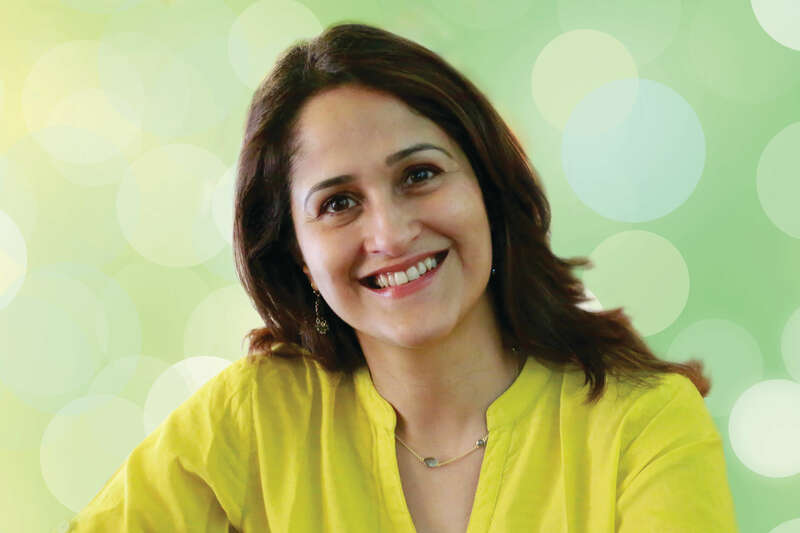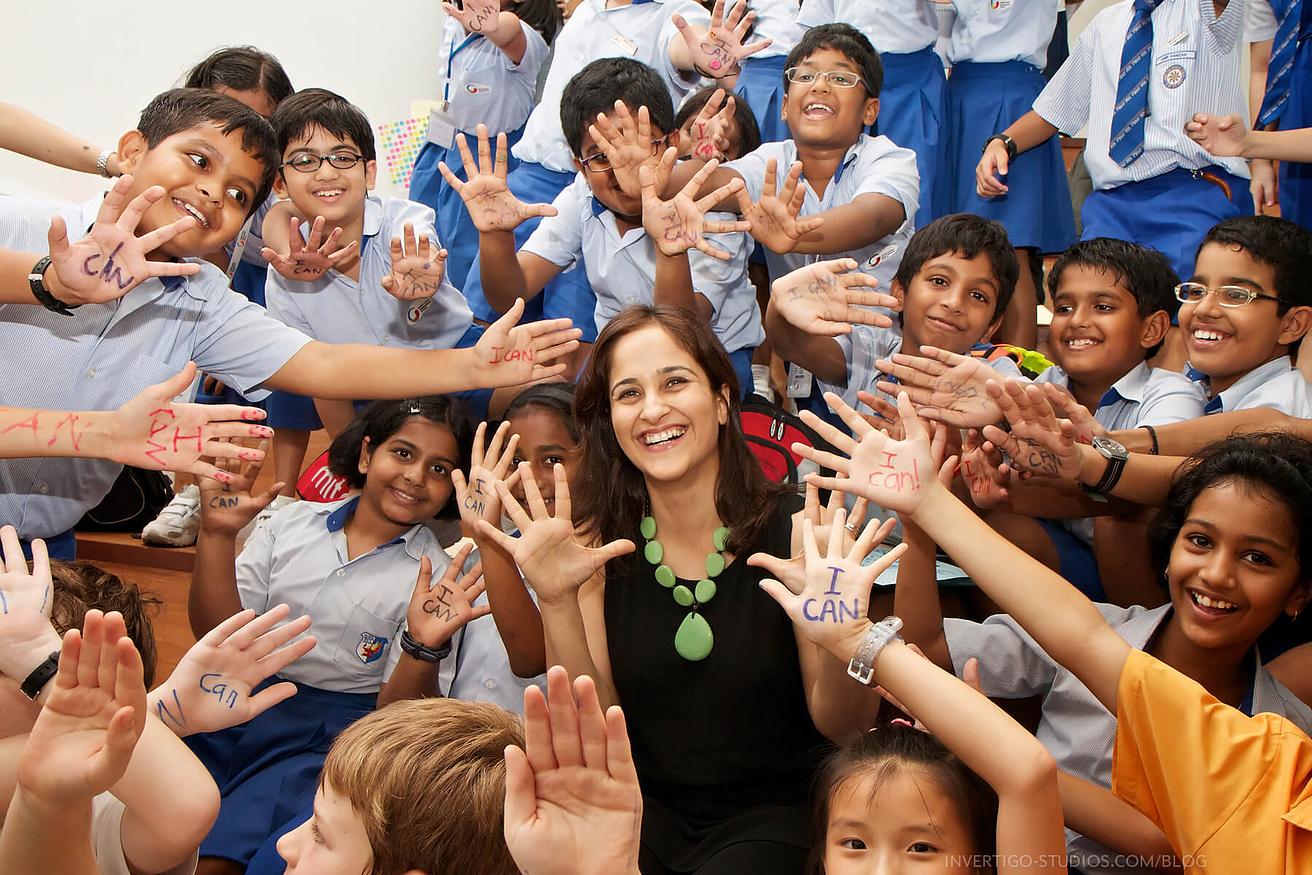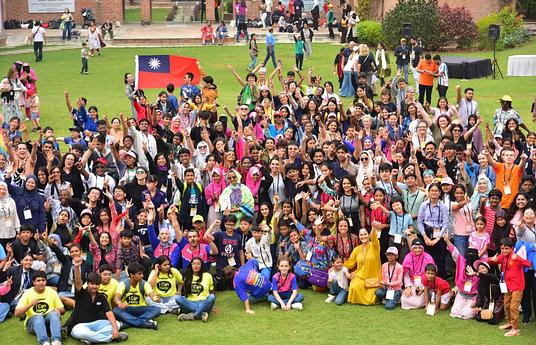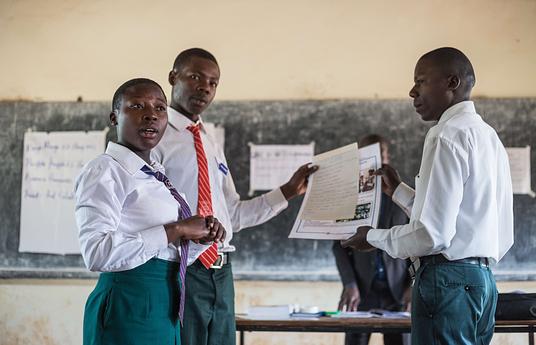On the morning Kiran Bir Sethi was due to open her school’s doors to parents for the first time, the region was hit by a 7.7 magnitude earthquake. “It was supposed to be my moment to show them this wonderful building, to say, ‘look, I’m not joking about this project’,” she recalls. “And then – bang!”
"If an earthquake couldn't pull us down, nothing could.”
The 2001 earthquake in Gujarat, India, was devastating: it killed several thousand people and flattened millions of homes. Some might have viewed the event’s timing as a bad omen for starting a radical new business, but Sethi took strength from the disaster. “I put it into context by thinking that if an earthquake couldn't pull us down, nothing could,” she says.
That year, Sethi opened the Riverside School in Ahmedabad with a first cohort of 27 pupils and seven teachers. The project caused a stir in the local community for several reasons: it was a risk, designed to shake up attitudes towards early years education by placing empathy and creativity at the heart of the curriculum.

“It was a breakaway from tradition,” Sethi explains. “I wanted to move away from exams and the classic chalk-and-talk classroom design. People grumbled about it…but I had zero interest in peoples’ criticisms and quibbles. With hindsight, we were so committed to the journey of the child and learning, the rest of it just didn't matter.”
A designer by trade, Sethi felt inspired to shake up traditional early years education in the region after witnessing her son coming home from his primary school with a defeatist attitude. “At just five years old, he encountered an education system that awarded compliance over conversation,” she says. “He started believing that he didn't have agency or voice – his response became ‘I can’t’, instead of ‘I can’.”
"It was not just an issue of access, it was the skill set that was lacking.”
Ahmedabad city is known as a centre for design and architecture – at a higher education level, its courses are at the cutting edge. But in schools, creativity was missing, she felt. “There was and still is an expectation for most children to simply get through school and then join the family business,” says Sethi. “There was a big gap between school and higher education for this reason but it was not just an issue of access, it was the skill set that was lacking.”
ALL IT TAKES IS AN ADULT WHO SAYS, ‘YES YOU CAN’
Sethi wanted to grant children a degree of autonomy in the classroom, encouraging the kind of equal conversation and debate between pupils and teachers that she had experienced in college. “I remember the shock of just being able to sit in a circle,” she recalls. “For 15 years I had just sat in a row and stared at the back of the girl in front of me, right? But here we were, sitting facing each other – and the teacher was leaning in to really listen to us. I may not have known it at the time, but that planted the seeds of what Riverside would eventually become.”
Riverside School is built on a set of four key principles: “feel”, “imagine”, “do” and “share”. The four steps are designed to encourage pupils to develop empathy in their understanding of problem-solving, team building, and acting on ideas. “It’s not textbook heavy, it doesn’t require resources. All it requires is an adult who says, ‘Yes, you can’,” says Sethi. The pupils are involved in school decision-making and are encouraged to present their own ideas for projects.
“For me, education is not just about tests, it is about building citizens who will eventually craft a nationhood – it's a much larger vision.”
“For me, education is not just about tests, it is about building citizens who will eventually craft a nationhood – it's a much larger vision,” she explains. “So imagine if you're constantly churning out graduates who believe they ‘can't’? Citizens, who feel disenfranchised or disempowered? How does a nation build on that? We talk about agency, but we've got to listen to our children at the age of seven, not just from when they are 17. I am often surprised by how uncommon this is.”
"Our governing principle is co-creation.”
Walking into the school itself, visitors will see a very flat structure – both architecturally and hierarchically. There is no dedicated principal’s office or staff room – all spaces are shared by the school community regardless of their age or stature. “Physical barriers make mental barriers,” Sethi explains. “What you will see is groups working together as equals: our governing principle is co-creation.”
80% OF GRADUATES WORK IN CREATIVE INDUSTRIES
Word of the school’s success spread after Sethi gave a TED talk in 2009 on teaching leadership in children. Her inbox became inundated with educators asking how they, too, could adopt the Riverside principles – and Design for Change was born. “We put all the information up online, in an open-source format, and said, ‘Please, feel free to do it!”
Two decades on since they started their first lessons at Riverside, Sethi’s son and daughter have both graduated and come to teach at the school part-time. Riverside estimates that 80 per cent of its graduates have gone on to work in creative industries and followed passion projects, an outcome Sethi feels proud to have been part of.
Today, she meets regularly with DFC partners around the globe and has welcomed the likes of former French president Nicolas Sarkozy, American psychologist Howard Gardner, and British educationalist Ken Robinson through Riverside’s doors.
"We didn't just start the school to tell a small story but that scale of influence is helping to shape a new narrative in education.”
“We’re grateful to have been visited by some of the world’s greatest minds and education leaders, who have all remarked that what is happening at Riverside is something special,” she says. “I think that really makes it worth it – to know that we didn't just start the school to tell a small story but that scale of influence is helping to shape a new narrative in education.”
KEEP CURIOSITY ALIVE
Back in 2001, Sethi never imagined that her ideas for teaching and learning would take off around the world – she was driven primarily by a wish to improve her own son’s confidence and provide him with the best opportunities through education. It’s this message she shares with budding entrepreneurs who want to make a change but feel intimidated by the scale of a project.
"I didn't set out to change education, I wanted to change my son's life. Over time, the skills grew as the team grew. As we understood better, we were able to shape a different language for education.”
“I don't think there's a dearth of ideas in the world, but there is not always the stamina to go through with them. If it's not personal and it doesn't bother you every single day, you might lose the stamina to stay with it long,” she says. “I didn't set out to change education, I wanted to change my son's life. Over time, the skills grew as the team grew. As we understood better, we were able to shape a different language for education.”
“We are only in 60 countries right now, and the last I counted I think there were 198 countries in the world – so we have a long way to go.”
As for Sethi’s ambitions going forward, she says with a smile: “We are only in 60 countries right now, and the last I counted I think there were 198 countries in the world – so we have a long way to go.”
She credits her team’s passion and unending curiosity for learning as the key motivation for her work. “We must be curious. As a team, as children, as parents, as long as we don’t lose that lens of curiosity about the world and about how learning happens, then it’s a good space to be in."
If you have an innovation currently making an impact on education we would love to know! Submit your innovation to be considered for the Global Collection 2023 before June 1st.


